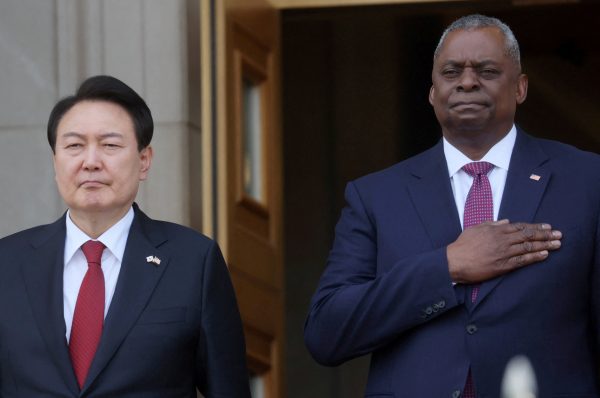Of particular significance during the summit meeting was the unveiling of the Washington Declaration that established the US–South Korea Nuclear Consultative Group (NCG). The Declaration represents a response to several consequential domestic and regional developments.
In South Korea, the public debate over developing nuclear weapons gained unprecedented attention after President Yoon’s comment in January 2023 about the possibility of South Korea going nuclear. Polls in South Korea show the percentage of domestic support for the acquisition of nuclear weapons ranging between the high 60s and mid-70s.
The factors driving the South Korean public’s sentiment include concerns over the US extended deterrence commitment and whether the United States would defend South Korea if North Korea were to simultaneously threaten the US mainland. Advocates of nuclearisation also call for nuclear balance with North Korea’s nuclear arsenal and greater autonomy and agency over South Korea’s ability to defend itself in the face of growing regional and global security challenges.
Regionally, North Korea has continued to advance its military capabilities. Within the first five months of 2023, the country has launched six short-range ballistic missile tests, three cruise missile tests and three intercontinental ballistic missile tests.
These tests — which have used a diverse set of launch sites and delivery systems — signify North Korea’s desire for continued progress within its weapons program through the operationalisation of potential nuclear-use scenarios. These advancements also underscore North Korea’s perception that it must continue strengthening its nuclear forces and maintain its readiness to counter what it views as long-term military threats to the survival of the regime.
In response to the growing threat posed by North Korea’s weapons program, the United States, Japan and South Korea have strengthened trilateral security cooperation with the expansion of military exercises.
In 2023, the three countries have conducted joint military drills for ballistic missile defence, anti-submarine warfare and search-and-rescue and maritime missile defence. These exercises aim to enhance force interoperability and showcase regional trilateral cooperation. Current discussions for the United States, Japan and South Korea to share North Korean missile warning data in real-time further reinforce efforts by the three countries to strengthen deterrence in the region.
The Washington Declaration does not represent a fundamental change in US nuclear policy towards South Korea, such as the redeployment of US nuclear weapons or sharing of US nuclear assets. Rather, the agreement assuages South Korean anxieties about North Korea and US defence commitments through joint planning, enhanced consultations and expanded training and tabletop exercises.
The NCG envisions an increased role for South Korea to consult and coordinate with the United States against a potential North Korean nuclear attack. This addresses the concerns of South Korean advocates who have argued since the early 2000s for strengthening extended deterrence efforts within the alliance and embedding US nuclear deterrence into a broader framework like the NATO Nuclear Planning Group. In this sense, opponents of a nuclear South Korea and moderate nuclear proponents now have a concrete agreement to point to when debating against independent nuclear acquisition.
But the agreement may not prove satisfactory for resolving the South Korean public’s perceived vulnerability against North Korea’s expanding nuclear arsenal. Nor does it assuage nuclear proponents who desire the return of US nuclear weapons or US support for a South Korean nuclear weapons program. For some nuclear advocates, it is likely that only South Korean control over nuclear weapons — whether owned by the United States or South Korea — will resolve the current nuclear debate.
The ability of the NCG to quell South Korean desires for nuclear weapons may depend on the speed and robustness of its implementation. Still, the United States and South Korea will simultaneously need to explore alternative or additional measures for bringing North Korea back to the negotiating table. Extended deterrence and diplomacy should strengthen in conjunction with — rather than at the expense of — one another.
While the Washington Declaration may have moved forward the needle in addressing existing questions regarding US defence commitments to South Korea, South Koreans will continue assessing whether US extended deterrence could come under future threat and how South Korean defence capabilities should evolve alongside regional security threats.
The upcoming US presidential election and the international community’s response to continued North Korean testing will likely contribute to how South Koreans evaluate the path ahead.
Jennifer Ahn is the Research Associate for Korea Studies at the Council on Foreign Relations.

